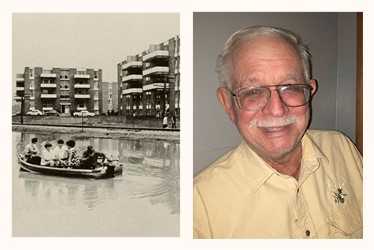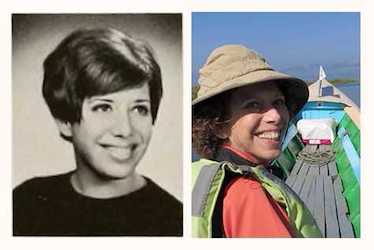The new year marks a special anniversary for the Ohio University class of 1968, as these Golden Bobcats celebrate years of success and achievement since waving farewell to Athens 50 years ago.
OHIO’s campus was bustling with activity in the late 1960s: The nation was embroiled in a controversial war in Vietnam; war and civil rights protests erupted across the nation; and Martin Luther King, Jr. was assassinated in 1968. College campuses nationwide grew tense and unrestful, eventually culminating in reactions to the 1970 student shootings at Kent State University.
As OHIO students sought to make sense of their surroundings, they also worked hard toward academic and personal achievement.
To get a better idea about what Athens was like in the late ’60s, four Golden Bobcats reflected on their University experience.
Below are their excerpted responses to our questions. Photos from the Athena Yearbook and provided by pictured alumni.
David Enterline, MS, Plant Biology

Enterline served on Ohio University Student Senate and was involved in ensuring students were safe during Vietnam War protests and the infamous flooding in the spring of ’68. After graduating with his master’s degree from OHIO, he took a teaching position at the nearby Hocking College in Nelsonville, Ohio.
What was it like being on campus during such a controversial war?The war left everyone divided. My best high school buddy went to the United States Military Academy at the wrong time. He did not make it back [home]. War is so political, and you do not know who or what to trust.
I was on Graduate Student Senate. It was not a position I thought I would ever have because I wasn’t super political. There were smaller marches and protests on campus, but it got worse after the Kent State shootings in 1970. The University decided to cut the quarter short after that happened.
Any memorable moments at Ohio University?The Hocking River flooded. I went to Porter Hall and nobody was there. I thought we needed some security. I camped out in the building for a day.
Across the street from Porter Hall, students were jumping out of the dorm windows into the water. At one time, I had to break out a window to get into a building to save equipment from being destroyed by water.
Where did your major take you?After graduation, I taught at Hocking College with a man named Bill Price, who was the first naturalist in Ohio. At the same time, I was trying to write my master’s thesis.
We started the natural resource department at Hocking College in 1968. Over the years, I taught a whole lot of different courses in natural resources.
Lieutenant Colonel John Blair, BSED, Physical Education

As a member of the cross-country and track teams and Beta Theta Pi Fraternity, Blair kept busy during his time at OHIO. After graduation he served in the U.S. Air Force before settling in Illinois to work in the real estate business.
What were you involved in at Ohio University?I was a cross-country and track runner. I was recruited by many different colleges in Ohio, but I chose OHIO because of Coach Stan Huntsman. Huntsman was at the University for 13 years. He was highly successful. He then went to the University of Tennessee and won the national championship in cross-country and track. He was selected as the head track and field coach for the men’s American team at the 1988 Olympic Games in Seoul, Korea.
I was on the cross-country team in 1964 that finished third in the nation. We had some outstanding runners, and teammate Elmore Banton was the individual national champion. He later became coach at Ohio University, serving for 23 years.
What was it like being an athlete and a student?I would wake up at 6 a.m. I would go down to Peden Stadium where the team would run and be done by 7 a.m. Then I had to work starting at 8 a.m., and then go to classes. Then we would have an afternoon workout at 3 p.m. After practice I would eat dinner. I was dead tired by 10 p.m.
You were also in Air Force ROTC – what was that like?My older brother and I both went through the Air Force ROTC program. He was a pilot during the Vietnam War. Being in the field that I was in, I was not in the war fighting effort. But, for nearly 23 years, I served by directing morale, welfare and recreation programs for military members and their families. My physical education and recreation background at Ohio University was definitely beneficial throughout my military career.
Andrea Helman, BSJ, Journalism

As a student, Helman joined WOUB Public Media as one of its only female reporters. After graduation, she worked at several media outlets. She currently publishes children’s books in Seattle.
What was it like being a student reporter in the late ’60s?Being a girl in journalism at that time was not common, but I had no doubt that was what I was going to do. I picked Ohio University because it was one of the top journalism schools in the nation.
What was your experience working for WOUB?I remember thinking, “Oh, wouldn’t it be a hoot if a girl showed up for an audition.” There were one or two other girls who worked there. It was a boys’ club.
I ended up having my own show called “Broadway’s Best.” I would tell the story of a show through the music, but I knew nothing technologically.
I also had an internship at the Columbus Citizen Journal when I was 19. It was such an oddity that there was a girl in the newsroom, as opposed to the society page, that the internal Scripps Howard magazine did a story called “They call her Andy.”
What sort of challenges did you experience being a female in the field of journalism?In June of 1968, I was very confident of where I was going because I thought I had a job with the Chicago City News Bureau. I had gone there and interviewed. I was thrilled.
Then I got a letter from the general manager who interviewed me. It said, “Andy, we have never had any women on our staff. And the board of directors voted not to begin with that.”
The interesting thing about this story is when people say to me, “Why didn’t you sue?” They need to pause for a minute and think. The naivety of saying, “You don’t have this job because you’re a woman,” would be illegal today, but that’s just the way it was then.
It changed everything. I did not go to Chicago because I did not have a job. Instead, I ended up in Cleveland.
Any particularly memorable moments at Ohio University?The head of the Nazi Party came to campus. The Ohio University newspaper did an article and said, “Would everyone please wear white from the waist up. Don’t speak. Don’t applaud. Don’t boo. Don’t make any noise.” And that is exactly what happened.
This man walked on stage and made his speech, and no one in Templeton-Blackburn Alumni Memorial Auditorium made a sound. Everyone dressed in white from the waist up. Everybody in that auditorium let that happen. They did it with grace, smarts and class.
John Nixon, BSIT, Industrial Technology

After studying at OHIO, Nixon received a doctorate from Vanderbilt University in educational and developmental psychology. During his time in Athens, Nixon was involved with protests against the Vietnam War and racial inequality.
What are your fondest memories of Ohio University?The fondest memories I have at OHIO are my engineering classes and the friends I made. Also, I enjoyed driving around the beautiful countryside around Athens on my motorbike.
I never joined any clubs. I was concerned about racial and poverty issues and was involved in protests about Vietnam and racial justice.
What was it like being involved with political protests on campus during the late ’60s?One winter day, we took over the main streets. We rolled a giant snowball down the main streetto the main green. The streets were filled with students, and the Ohio University and local police were patient with the doings.
Why did you choose your major? Where did it lead you?I chose my major because of my interest in tech. At the time, I was very involved in racing and motorcycles.
I moved to New York in 1973, and I eventually started my career as a psychology professor at the State University of New York (SUNY).I also had a private practice working with children, families and area schools.
In 2000, I was awarded a Fulbright fellowship to teach in Ukraine. I later received a three-yeargrant to continue my work with universities in Ukraine.I was awarded a distinguished professorship at SUNY in 1999. I retired in 2013.
Golden Bobcats are encouraged to return to Athens this May for On The Green Weekend , during which they’ll receive free admission to the weekend’s events celebrating OHIO’s academic and arts programs.

